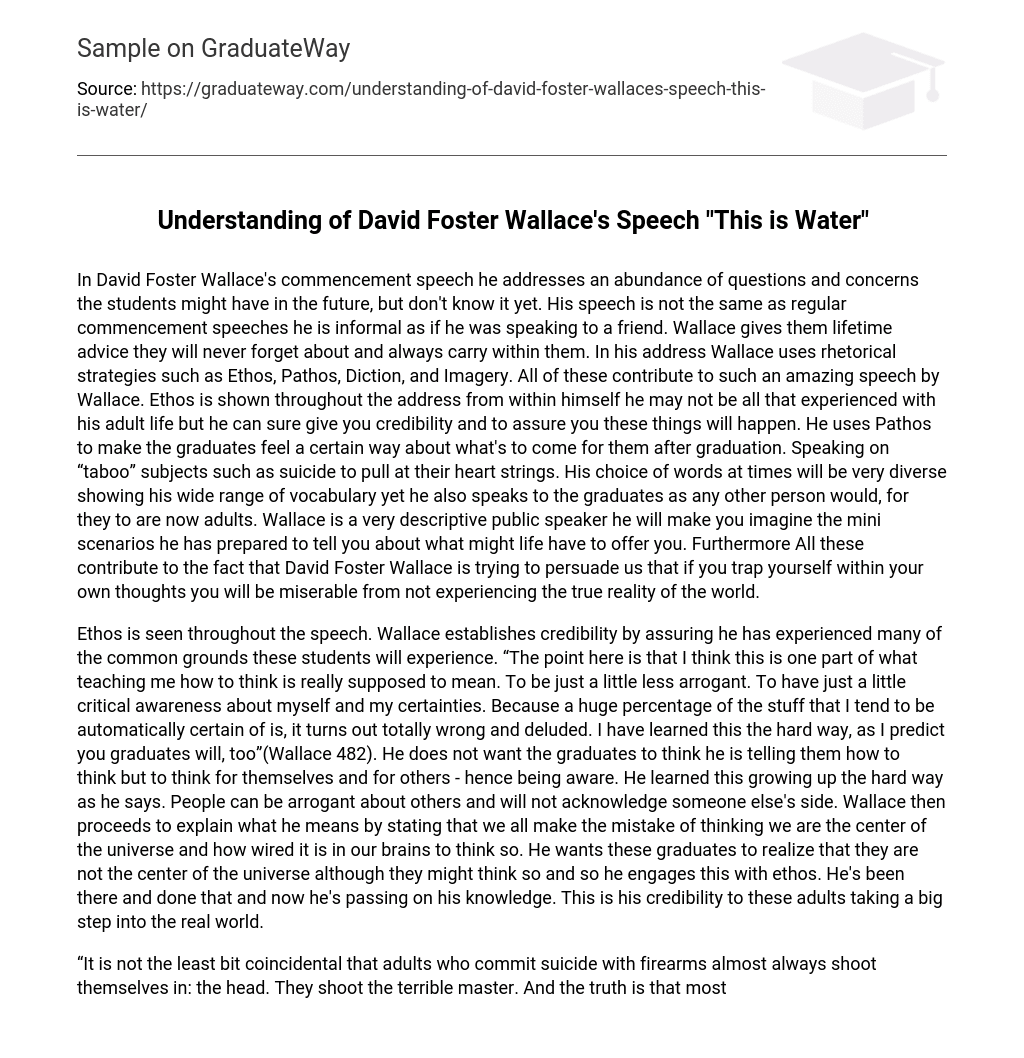In David Foster Wallace’s commencement speech he addresses an abundance of questions and concerns the students might have in the future, but don’t know it yet. His speech is not the same as regular commencement speeches he is informal as if he was speaking to a friend. Wallace gives them lifetime advice they will never forget about and always carry within them. In his address Wallace uses rhetorical strategies such as Ethos, Pathos, Diction, and Imagery. All of these contribute to such an amazing speech by Wallace. Ethos is shown throughout the address from within himself he may not be all that experienced with his adult life but he can sure give you credibility and to assure you these things will happen. He uses Pathos to make the graduates feel a certain way about what’s to come for them after graduation. Speaking on “taboo” subjects such as suicide to pull at their heart strings. His choice of words at times will be very diverse showing his wide range of vocabulary yet he also speaks to the graduates as any other person would, for they to are now adults. Wallace is a very descriptive public speaker he will make you imagine the mini scenarios he has prepared to tell you about what might life have to offer you. Furthermore All these contribute to the fact that David Foster Wallace is trying to persuade us that if you trap yourself within your own thoughts you will be miserable from not experiencing the true reality of the world.
Ethos is seen throughout the speech. Wallace establishes credibility by assuring he has experienced many of the common grounds these students will experience. “The point here is that I think this is one part of what teaching me how to think is really supposed to mean. To be just a little less arrogant. To have just a little critical awareness about myself and my certainties. Because a huge percentage of the stuff that I tend to be automatically certain of is, it turns out totally wrong and deluded. I have learned this the hard way, as I predict you graduates will, too”(Wallace 482). He does not want the graduates to think he is telling them how to think but to think for themselves and for others – hence being aware. He learned this growing up the hard way as he says. People can be arrogant about others and will not acknowledge someone else’s side. Wallace then proceeds to explain what he means by stating that we all make the mistake of thinking we are the center of the universe and how wired it is in our brains to think so. He wants these graduates to realize that they are not the center of the universe although they might think so and so he engages this with ethos. He’s been there and done that and now he’s passing on his knowledge. This is his credibility to these adults taking a big step into the real world.
“It is not the least bit coincidental that adults who commit suicide with firearms almost always shoot themselves in: the head. They shoot the terrible master. And the truth is that most of these suicides are actually dead long before they pull the trigger”(482). Wallace wants us to think of those who can no longer stand their thoughts and slowly fall victim to suicide. For many that can be a tough subject to approach specifically in a commencement speech that is opening up a new pathway to the graduates. Many people deal with these thoughts silently and might even relate to what Wallace has stated. This is pathos he might even be striking a cord in someone whose lost someone to suicide or has been thinking of it. It makes you feel for others whether it’s your pain or not. Wallace mentions that these adults might have been long gone even before actually ending their lives because they were imprisoned by their own thoughts and didn’t learn how to think outside of it. There are many things that you are not taught once you leave college, it is the dull sad moments and the feelings of imprisonment within yourself. Essentially he wants to bring out an emotional response from the audience with list citing realistic and straightforward situations.
Diction plays an important role in the way Wallace addresses the graduates of Kenyon College. His use of words really reflects what he is trying to get across yet he does it in such a simplistic way anyone can understand his points. In other words it is informal, compared to usual commencement speeches. Here and there he will use a wide range of words but then transition into a more casual vocabulary. He addresses the audience as “you” making it personal and even more engaging. The tone is very friendly instead of academic it’s as if a friend is giving you some great advice. He constructed a common ground and a relatable connection with the audience.





